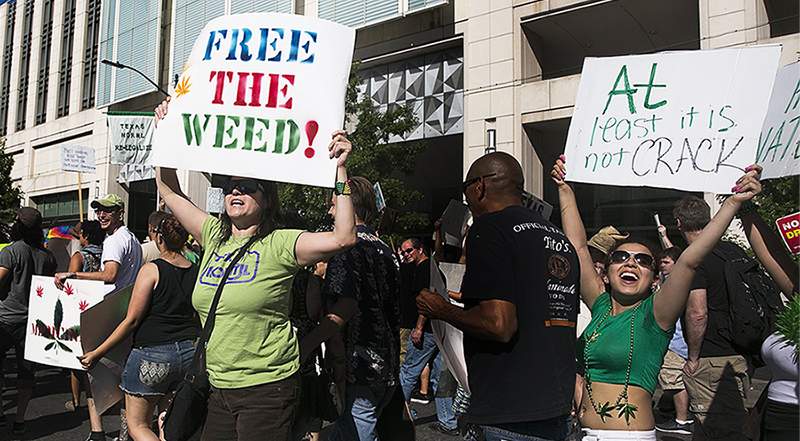Lead image via PaceDM
2018 might just be the year that the federal government finally takes steps to enact some measure of cannabis reform. A new bill to protect canna-legal states from federal interference has received unprecedented support from a bipartisan group of state governors and even President Trump himself. The bill, officially known as the Strengthening the Tenth Amendment Through Entrusting States (STATES) Act of 2018, would essentially prevent the federal government from interfering with any state, U.S. territory, or tribal land that chooses to legalize or decriminalize cannabis in any form.
Earlier this year, Republican Sen. Cory Gardner managed to wrangle a promise from President Trump to support legislation to protect canna-legal states. Immediately following this promise, Gardner announced that he was working with Democratic Senator Elizabeth Warren to draft just such a bill, which has materialized this month as the STATES Act. On Friday, the president somewhat reaffirmed his promise, telling reporters that he "probably will end up supporting" this new bill.
The STATES Act would not legalize cannabis on a federal level, but would amend the Controlled Substances Act (CSA) so that "its provisions no longer apply to any person acting in compliance with state or tribal laws relating to the manufacture, production, possession, distribution, dispensation, administration, or delivery of marijuana." The bill would also exclude industrial hemp from the definition of "marihuana" in the CSA.
On top of that, the proposed legislation would also ensure that all financial transactions connected to state-legal cannabis operations are no longer considered illegal drug trafficking. This change would free up the financial industry to serve the cannabis industry without fear of federal censure, finally allowing canna-businesses access to banks, loans, and tax deductions.
The bill does prohibit anyone under 18 from working in a cannabis facility, and also prohibits the sale of recreational cannabis to anyone aged under 21. Even if passed, the bill would not end all federal enforcement of cannabis crimes, as anyone who violates any aspect of a state's cannabis laws would remain subject to full federal prosecution. The bill also leaves individual states with the right to continue prohibiting any and all forms of cannabis use at their own discretion.
At a press conference to introduce the new bill, Senator Warren explained that federal cannabis prohibition laws "make it harder for veterans to get treatment for chronic pain," Westword reports. "They keep children with chronic diseases in agony and they make life miserable for individuals struggling with terminal diseases." Warren also noted the "widespread discrimination these policies foster across our communities… that have devastated communities of color."
Gardner, who admitted that he was once opposed to cannabis legalization, explained that "our founders intended the states to be laboratories of democracy. Many states right now find themselves deep in the heart of that laboratory. As the president said in a conversation with me, 'We can't go backwards. We can only go forward.' The ketchup's not going back in the bottle, as the old saying goes."
There are still many opponents of cannabis reform in Congress, but support for the STATES Act is coming in from all sides. Last Friday, six Democratic and six Republican state governors sent a letter to Congress asking lawmakers to support the new bill. "Our states have acted with deliberation and care to implement programs through thoughtful and comprehensive legislation and regulations," the governors wrote, according to Marijuana Moment. "Our citizens have spoken, we are responding. We ask that Congress recognize and respect our states' efforts by supporting and passing the STATES Act."
The letter, signed by the governors of Alaska, California, Colorado, Maryland, Massachusetts, Nevada, New Jersey, New York, North Dakota, Oregon, Pennsylvania and Washington, also said that "as of today, 46 states permit the use of some form of medical marijuana and 8 states have made it legal for adult-use. These programs reflect the will of the people as expressed through ballot initiatives and legislative action."











